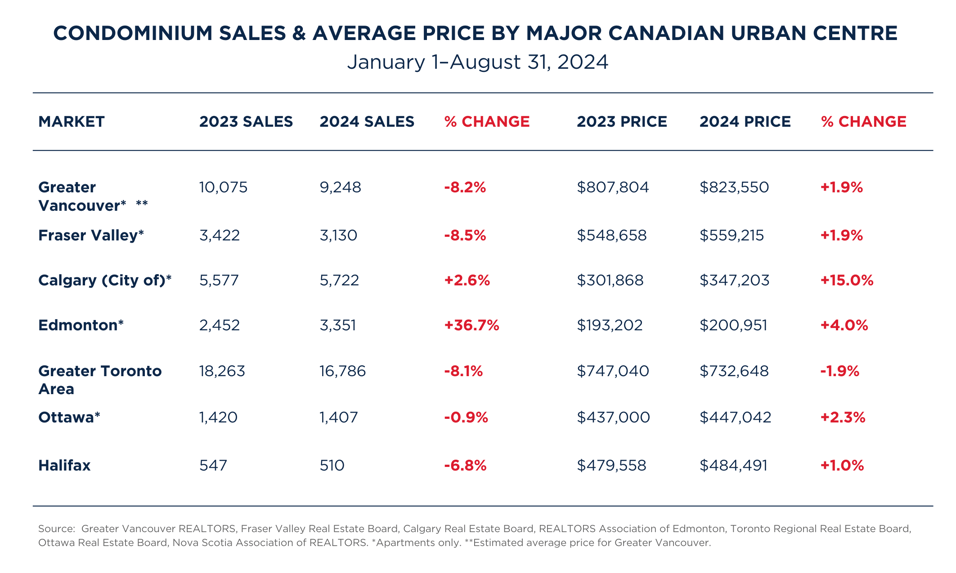As 2024 unfolds, Canada’s condominium market is
experiencing a significant surge in inventory, with double-digit increases
reported in most major urban centres. The rise in available listings signals
that sellers, encouraged by the prospect of future interest rate cuts, are
returning to the housing market. Buyers, although cautious, are beginning to
re-engage, testing the waters before further rate reductions materialize.
RE/MAX analyzed condominium activity between January
and August 2024 across seven key markets: Greater Vancouver, Fraser Valley,
Calgary, Edmonton, Greater Toronto, Ottawa, and Halifax. The findings show that
condo listings have increased substantially as sellers anticipate higher demand
in late 2024 and early 2025. The highest growth in inventory was recorded in
the Fraser Valley (58.7%), followed by Greater Toronto (52.8%), Calgary
(52.4%), Ottawa (44.5%), Edmonton (17.7%), Halifax (8.1%), and Vancouver (7.3%).
Despite the influx of listings, values have remained resilient, with notable price increases in Calgary (15%), Edmonton (4%), Ottawa (2.3%), Vancouver (1.9%), Fraser Valley (1.9%), and Halifax (1.2%). The only exception was Greater Toronto, where prices dipped by 2%. Sales activity was particularly strong in Alberta, with Edmonton leading the way with a nearly 37% increase in condo sales compared to last year. Calgary saw a more modest 2.6% increase, while other markets experienced a softening in sales activity.

Interest Rates, Buyer Hesitation, and What Lies
Ahead
High interest rates and strict lending policies have
weighed heavily on first-time buyers in recent years, with many unable to
achieve homeownership despite facing soaring rental costs. However, RE/MAX
Canada President Christopher Alexander suggests this current lull may be
temporary. "This is the calm before the storm," he says. Pent-up
demand is expected to drive stronger market activity in spring 2025,
particularly at entry-level price points, as first-time buyers and investors
re-enter the market.
Alberta's condominium markets remain firmly in
seller’s market territory, while conditions in Greater Vancouver, Fraser
Valley, Ottawa, and Halifax have balanced out. These markets are expected to
transition further in 2025. Toronto, however, may take longer to recover from
its sluggish performance. But as Alexander notes, "Toronto is a market
that can turn quickly," with absorption rates serving as a key indicator
for its rebound.
While rising inventory is drawing more interest from potential buyers, many remain cautious, given the recent rate increases. Early interest rate cuts in 2024 did little to spur significant market engagement, but with more cuts and policy adjustments expected, activity is likely to pick up—especially among end users.
Hot Pockets and Emerging Trends
Even in softer markets, certain condo pockets are
defying the overall trend. In Greater Toronto, midtown communities such as
Yonge-Eglinton and Forest Hill South saw double-digit sales increases in early
2024. The west end's High Park and Roncesvalles neighborhoods also posted
strong gains, as did the Beaches in the east end. In Greater Vancouver,
suburban areas like Port Coquitlam and recreational hubs such as
Whistler/Pemberton reported increased sales.
Investor activity, however, has slowed, particularly
in Greater Toronto, where up to 30% of investors are experiencing negative cash
flow due to rising mortgage costs. Despite high rental demand and low vacancy
rates, investor confidence is expected to recover as interest rates fall and
returns on investment improve. Edmonton stands out as an exception, where
investors have been actively revitalizing older condo properties, benefiting
from the city's affordability and lower development costs.
A Window of Opportunity for Buyers
"This is a unique moment for aspiring condo
buyers," says Alexander. End users are now in the driver's seat, with less
competition from investors and a better supply of available units, especially
in markets like Toronto and Vancouver. As values are expected to rise, buyers
could be entering the most favorable climate in years.
Immigration and Long-Term Demand
Looking ahead, immigration will continue to bolster
demand for condominiums, as newcomers to Canada increasingly view condos as
both a first and middle step toward homeownership. While population growth may
slow in the short term, projections by Statistics Canada estimate the
population will reach up to 49 million by 2035, supporting long-term demand for
condominiums.
Urbanization and increasing density will further fuel
the condo market's growth, with condos becoming the heart of Canada's largest
cities. As urban cores evolve, younger generations are driving demand for
vibrant communities with robust amenities, ensuring that condominiums remain
central to the housing mix.
"The evolution of Canada’s housing market is well
underway," says Alexander. "Condominiums are not only adapting to
this new reality but are poised to become the driving force of urban real
estate for years to come."


